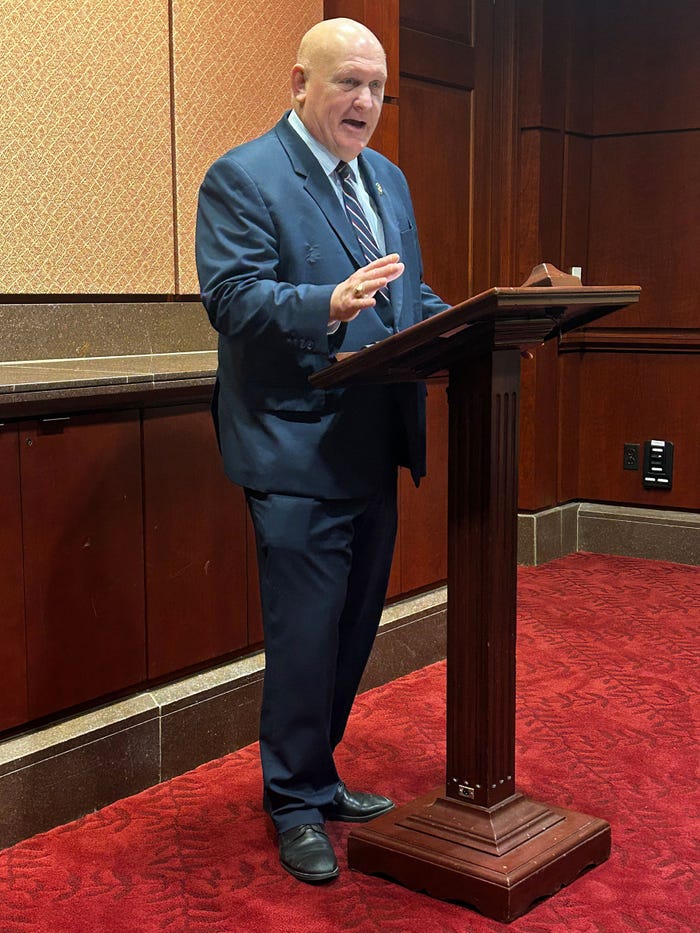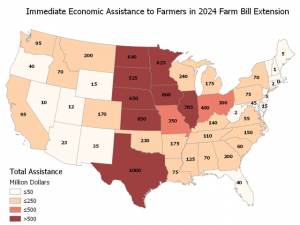
My Take: Money and politics have slowed the farm bill process down to a crawl.
I remember the 2023 Pennsylvania Farm Show vividly. Rep. Glenn “GT” Thompson, R-Pa., was the newly elected chairman of the House Ag Committee, the first committee chairperson from Pennsylvania in 170 years.
It was an exciting time, especially considering Thompson took over the committee with a new farm bill being negotiated. Having a Pennsylvania voice with that much power was welcomed by farmers and local ag leaders I talked to at the time.
But fast-forward more than a year, and we are no closer to a new farm bill than we were back then. No farm bill has come out of committee, and Thompson, once again, has pushed back the date to get a farm bill released — this time just before Memorial Day.
We’ll have to see if he can deliver. But, as usual, money and politics are slowing things down inside the Beltway. It didn’t take long for me to realize this during a visit I made to Washington, D.C., last week.

HOUSE CHAIRMAN: Rep. Glenn “GT” Thompson, R-Pa., chairman of the House Ag Committee, said the most recent farm bill proposal presented to Rep. David Scott, D-Ga., ranking member of the committee, includes a robust farm safety net fully funded with no IRA or SNAP (food stamp) dollars going to commodity programs. He also said he was willing to place IRA funding in the conservation title. (Photo by Chris Torres)
Let’s look at the money issue. A nearly $20 billion package of money set aside for farm conservation practices in the 2022 Inflation Reduction Act, or IRA, has become a big sticking point in farm bill negotiations.
Proponents of farm conservation call the funding historic, enabling more farmers than ever to get money for conservation practices through various USDA programs. Others have criticized it, saying it limits money to a specific set of conservation practices that must show greenhouse gas reductions, potentially limiting the number of farmers who will be able to get it.
Some representatives in the House want to place the IRA funding in the farm bill and redirect it to commodity support programs and conservation practices that may not be focused on fighting climate change.
At a meeting I attended last Tuesday with Thompson and Sen. Debbie Stabenow, D-Mich., chairwoman of the Senate Ag Committee, both were confident that this was a solvable issue and something that shouldn’t hold up a new farm bill.
Stabenow said the IRA funding covers 49 of the 50 most widely used conservation practices on farms. Placing it in the farm bill’s conservation title would enable farmers to get money through programs they already use, but she wants climate reduction language to stay in.
But the fact that the IRA was passed under reconciliation and was partisan — not one Republican supported it — has brought about the issues surrounding it, Stabenow said.

SENATE CHAIRWOMAN: Sen. Debbie Stabenow, D-Mich., chairwoman of the Senate Committee on Agriculture, Nutrition and Forestry, is retiring at the end of this year. She laments the politics that have blocked the passage of a new farm bill. (Photo by Chris Torres)
Thompson said the most recent farm bill proposal presented to Rep. David Scott, D-Ga., and ranking member of the committee, includes a robust farm safety net fully funded with no IRA or SNAP (food stamp) dollars going to commodity programs. He also said he was willing to place IRA funding in the conservation title.
According to Thompson, the ball is in the other side’s court. “The ranking member and the Democrats have some choices to make,” he said.
Which is a good lead-in to the politics of this whole thing. We’re in an election year now, and the closer we get to November, the more unlikely it is that any lawmaker would want to vote on anything that could paint them in a negative light with voters.
During a recent radio interview with Iowa ag reporters, Sen. Chuck Grassley, R-Iowa, said he was increasingly pessimistic that a farm bill would get done this year given the political situation in Congress.
Thompson admitted that politics and other issues were getting in the way of pushing a farm bill through. “While I wish we could have gotten this farm bill done earlier, there were some forces outside of our control that obviously prevented that,” he said.
Stabenow, who is retiring at the end of this year and has worked on five other bills, seconded that.
“It always takes a lot of work,” she said. “It’s always complicated. And I think unfortunately, this session has been more complicated by people who are focused more on ideology and politics rather than focused on what people need.”
So, when will the next farm bill pass? Your guess is as good as mine. Some of my ag journalist friends are handicapping the “lame-duck” session of Congress, right after this year’s election and just before the new year, as the most likely time a new farm bill could be passed.
But the clock is ticking. The next deadlines to keep an eye on are Sept. 30 and Dec. 31, when funding runs out for farm bill programs. Congress could, once again, extend the current farm bill as it did last year and just resume negotiations later. But that could lead into next year when a potential new president and Congress would take office. Then, who knows what will happen?
“As much as I would like to say we can get another farm bill to the Senate, as Sen. [Pat] Roberts and I did with 87 votes out of 100, I think that would be, right now given the makeup of the Senate, a tall order. And even a bigger order in the House. But do I believe we can get the votes, yes,” Stabenow said.
And the long, drawn-out slog to a brand-new farm bill continues.
You can now read the most important #news on #eDairyNews #Whatsapp channels!!!
🇺🇸 eDairy News INGLÊS: https://whatsapp.com/channel/0029VaKsjzGDTkJyIN6hcP1K























